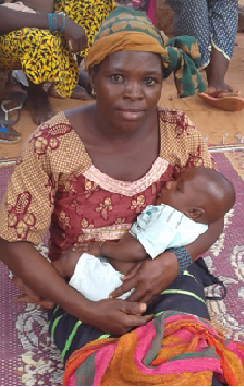Speeches Shim

Fatimata Diarra, the social behavior change assistant of Farakala health area in Sikasso region in the south of Mali, is witnessing evidence that behavior change is successful by showing women of childbearing age that behavior change is not an empty word but a set of practices that contributes to maintaining health. Chata Togola’s story illustrates her findings.
Chata Togola is a married mother of three children. During her first two pregnancies, she did not follow the nutritional advice given at her antenatal care visits. In addition, she did not take the different medicines such as iron, folic acid plus magnesium and the intermittent preventive treatment of malaria in pregnancy because Chata thought her baby would be too big and she would have trouble at delivery and might have to have a caesarean section. In Chata’s village, people think that rich foods will cause a pregnant woman to have a big baby and difficult delivery. By listening to the elder women in the village, Chata’s first two children had low birth weight and her health was compromised. “My children and I were frequently sick and I did not have enough breastmilk so I fed them with other foods”, confessed Chata.
When she got pregnant again, she followed the advice of the SBC assistant. She learned that she could have prevented her second child’s anemia. “During my third pregnancy, I started practicing the nutritional advice given to me at the antenatal care clinic and I noticed my health and my diet improved. In addition to the family meals, I ate additional legume-based meals, green leaves and fruit available and watched the progress of my pregnancy. I ate four to five times a day in addition to the tasty fruit that I had never done in my previous pregnancies,” explains Chata.
“I think that women are beginning to understand through the various talks and messages that nutrition is important and the old ways may not be the best”. - Chata Togola
When Chata gave birth, she had no difficulty or complications and the child came into the world in good health. Her child had a normal birth weight and the women in her neighborhood nutrition group were envious of his weight for his age. Chata gave birth at the health center and her child was exclusively breastfed for the first six months. “The secretion of milk is satisfactory because I am eating more too. After the delivery, I practice the nutritional advice that I received during the talks and during the antenatal and the post-natal care. Today, the boy is nine months old and she gives him complementary foods following the advice.
Currently, outside of the neighborhood nutrition sessions, several women outside Chata neighborhood group come to her for advice. “I really think that women are beginning to understand through the various talks and messages that nutrition is important and the old ways may not be the best. I thank the USAID/Nutrition and Hygiene Project very much for helping me to understand how to raise a healthy baby.
In Chata’s village today malnutrition among pregnant and lactating women and children has dropped. Many women now know how to prevent it without cost because it is about making diet changes and ignoring harmful practices. Women have not only learned new behaviors but also they commit themselves to practicing them regularly and learning the lessons too. Up today the Nutrition and Hygiene project helped to train 2,466 women as community leaders to educate others on breastfeeding and to promote nutritive cooking.
Nutrition and Hygiene is a 6-years project of $11, 4 million, which aims to improve the nutritional status of women and children in Sikasso region through a package of activities that includes social and behavior change. These activities increase the adoption of healthy behaviors for nutrition, health and hygiene increasing local production and availability of nutrient-rich foods.

Comment
Make a general inquiry or suggest an improvement.